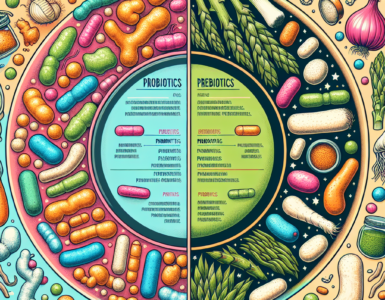Introduction to Vitamin D and Immune Health
Vitamin D, often referred to as the “sunshine vitamin,” plays a multifaceted role in maintaining overall health, particularly in the immune system. This fat-soluble vitamin is essential for numerous bodily functions, impacting everything from bone health to the regulation of cellular growth.
The Role of Vitamin D in the Body
Vitamin D’s primary function in the body is to regulate the absorption of calcium and phosphorus, which are critical for the formation of healthy bones and teeth. However, beyond its skeletal benefits, vitamin D is increasingly recognized for its role in modulating the immune system. It influences both the innate and adaptive immune responses, serving as an immune system regulator that helps prevent overactive immune responses which can lead to autoimmune conditions.
| Function | Importance |
|---|---|
| Calcium Absorption | Essential for bone health and strength |
| Immune Regulation | Prevents hyperactivity of immune response |
| Cell Growth | Controls cell cycle and prevents over-proliferation |
Understanding Autoimmune Diseases
Autoimmune diseases occur when the immune system mistakenly attacks healthy cells in the body, leading to inflammation and tissue damage. These diseases can affect various parts of the body and include conditions such as multiple sclerosis, rheumatoid arthritis, and type 1 diabetes.
The exact cause of autoimmune diseases is still under investigation, but it is believed to be a combination of genetic predisposition and environmental factors, such as infections, diet, and exposure to chemicals. One hypothesis is that a deficiency in vitamin D may contribute to the development of autoimmune diseases by impairing the immune system’s ability to distinguish between foreign invaders and the body’s own cells.
Understanding the connection between vitamin D and autoimmune diseases is crucial for middle-aged adults. As the body ages, the efficiency of vitamin D synthesis decreases, and the risk of developing chronic conditions, including autoimmune diseases, increases. Maintaining adequate vitamin D levels is an important aspect of aging healthily and may play a role in preventing the onset of autoimmune diseases.
The Science Behind Vitamin D and Autoimmune Diseases
How Vitamin D Regulates the Immune System
Vitamin D plays a crucial role in the regulation of the immune system. It is known to modulate both the innate and adaptive immune responses. Vitamin D receptors are present on the surface of a wide array of immune cells, including T cells, B cells, and antigen-presenting cells. When vitamin D binds to these receptors, it can influence the expression of genes that regulate the production of antimicrobial peptides, which are part of the body’s first line of defense against pathogens.
Furthermore, vitamin D is involved in the differentiation of T cells. It can promote the development of regulatory T cells, which are critical for maintaining immune tolerance and preventing overactive immune responses that can lead to autoimmune diseases. By modulating the immune response, vitamin D helps maintain a balance that can prevent the immune system from mistakenly attacking the body’s own tissues.
Research on Vitamin D’s Impact on Autoimmune Conditions
Over the years, numerous studies have investigated the link between vitamin D levels and the risk of developing autoimmune diseases. Research has shown that lower levels of vitamin D are associated with an increased risk of several autoimmune conditions. The following table summarizes key findings from research studies:
| Autoimmune Disease | Findings |
|---|---|
| Multiple Sclerosis | Higher levels of vitamin D are linked to a lower risk and less severe disease course. |
| Rheumatoid Arthritis | Vitamin D deficiency is common in patients and may influence disease activity. |
| Type 1 Diabetes | Early life vitamin D supplementation may reduce the risk of developing this condition. |
These studies suggest that maintaining adequate levels of vitamin D may have a protective effect against the development of autoimmune diseases. While the exact mechanisms are still being explored, the anti-inflammatory and immunoregulatory properties of vitamin D are central to its potential benefits.
It is important to note that while there is a correlation between vitamin D levels and the risk of autoimmune diseases, more research is needed to establish causation and to determine whether vitamin D supplementation can be used as a preventive or therapeutic measure. Ongoing clinical trials aim to provide more definitive answers on the role of vitamin D in autoimmune disease management.
Identifying Vitamin D Deficiency
Vitamin D plays a crucial role in bone health, immune function, and overall well-being. Deficiency in this vital nutrient can lead to a host of health issues, including a potential increase in the risk for autoimmune diseases.
Symptoms of Vitamin D Deficiency
Individuals with a vitamin D deficiency may experience a range of symptoms, some of which are subtle and may go unnoticed until the deficiency becomes severe. Common signs include:
- Fatigue and tiredness
- Bone pain and lower back pain
- Muscle weakness, muscle aches, or muscle cramps
- Mood changes, like depression
- Impaired wound healing
It is important to recognize these symptoms early and consult a healthcare provider for appropriate testing and diagnosis.
Risk Factors for Vitamin D Deficiency
Certain individuals may be at a higher risk for vitamin D deficiency due to various environmental and physiological factors. Recognizing these risk factors can help in early identification and management. Key risk factors include:
| Risk Factor | Description |
|---|---|
| Limited Sun Exposure | Insufficient sunlight can lead to lower synthesis of vitamin D in the skin. |
| Age | Older adults have reduced skin ability to produce vitamin D. |
| Skin Pigmentation | Darker skin has more melanin, which reduces the skin’s ability to produce vitamin D from sunlight. |
| Geographic Location | People living far from the equator may have less year-round sun exposure. |
| Dietary Habits | Vegetarian or low-intake of vitamin D-rich foods can lead to deficiencies. |
| Body Weight | Individuals with a higher body mass index (BMI) may have lower blood levels of vitamin D. |
| Malabsorption | Conditions affecting gut health can lead to poor absorption of vitamin D. |
Awareness of these risk factors encourages proactive steps towards maintaining adequate vitamin D levels, potentially reducing the risk of autoimmune and other diseases. Regular monitoring and adopting a lifestyle that includes adequate exposure to sunlight, a balanced diet, and supplementation when necessary can help maintain optimal vitamin D levels for immune health and overall well-being.
Sources of Vitamin D
Vitamin D, a crucial nutrient for immune health and wellbeing, can be obtained from various sources. Understanding these sources is essential for anyone looking to improve their intake, particularly those interested in the nutrient’s role in preventing and managing autoimmune conditions.
Sunlight and Vitamin D Synthesis
The body’s primary source of vitamin D is through the synthesis that occurs when skin is exposed to sunlight, specifically ultraviolet B (UVB) rays. This process naturally initiates the conversion of cholesterol in the skin to vitamin D3. Factors such as time of day, skin pigmentation, age, and geographic location can influence the efficiency of vitamin D synthesis.
| Factor | Impact on Vitamin D Synthesis |
|---|---|
| Time of Day | Midday sun exposure is typically most effective |
| Skin Pigmentation | Increased melanin reduces vitamin D production |
| Age | Synthesis decreases with age |
| Geographic Location | Closer proximity to the equator increases production |
Dietary Sources of Vitamin D
While sunlight is a significant source, dietary intake of vitamin D also plays a vital role. There are two forms of vitamin D that are important for humans: D2, which is found in plant-based foods and certain fungi, and D3, which is found in animal-based foods.
| Food Source | Vitamin D Content (IU per serving) |
|---|---|
| Fatty Fish (e.g., salmon, mackerel) | 570 – 800 |
| Fortified Milk | 120 – 130 |
| Egg Yolk | 40 – 50 |
| Fortified Cereal | 40 – 100 |
| Mushrooms (exposed to UV light) | 400 – 500 |
Vitamin D Supplementation
For individuals unable to get enough vitamin D through sun exposure and diet, supplements can be an effective alternative. Available in various forms and dosages, supplementation should be tailored to individual needs, often determined by a healthcare provider.
It is imperative for those considering vitamin D supplements to be aware of the recommended dietary allowances (RDA) for their age and health status. Exceeding the RDA can lead to health complications, therefore it is advised to consult a healthcare professional before initiating any supplementation regimen.
| Age Group | Recommended Dietary Allowance (IU/day) |
|---|---|
| Adults (19-70 years) | 600 – 800 |
| Adults (>70 years) | 800 |
Ensuring adequate levels of vitamin D is important for overall health and can be particularly significant for those concerned with autoimmune diseases. By combining different sources of vitamin D, individuals can maintain optimal levels and potentially mitigate the risk and impact of autoimmune conditions. Regular monitoring of vitamin D levels, through testing, can help guide dietary choices and supplement use.
How to Ensure Adequate Vitamin D Levels
Maintaining adequate levels of vitamin D is a critical aspect of immune health, particularly concerning the prevention and management of autoimmune diseases. There are several steps individuals can take to ensure they are getting enough of this essential nutrient.
Testing for Vitamin D Levels
The first step to ensuring adequate vitamin D intake is to have one’s levels tested. This is typically done through a blood test that measures the concentration of 25-hydroxyvitamin D, the main storage form of the vitamin in the body.
Testing is important because vitamin D deficiency can be asymptomatic. If one suspects they are at risk for deficiency due to lack of sunlight exposure, dietary habits, or other factors, they should consider talking to a healthcare provider about getting tested. Ideally, levels should fall within the sufficient range, generally considered to be between 20 to 50 nanograms per milliliter (ng/mL).
| Vitamin D Status | 25(OH)D Level (ng/mL) |
|---|---|
| Deficient | <20 |
| Insufficient | 20-29 |
| Sufficient | 30-50 |
| High, but not toxic | 50-100 |
| Toxic | >100 |
Recommended Vitamin D Intake for Different Age Groups
The recommended dietary allowance (RDA) for vitamin D varies depending on age, gender, and life stage. The following table outlines the RDA for different age groups.
| Life Stage | Age | RDA for Vitamin D (IU/day) |
|---|---|---|
| Infants | 0-12 months | 400 |
| Children | 1-18 years | 600 |
| Adults | 19-70 years | 600 |
| Older Adults | 71 years and older | 800 |
| Pregnant and Lactating Women | Any age | 600 |
These recommendations aim to maintain bone health and overall well-being. However, some individuals may require higher doses of vitamin D to address deficiencies or specific health concerns, such as autoimmune diseases. It’s imperative to consult with a healthcare provider before making any significant changes to one’s vitamin D intake, as excessive amounts can lead to toxicity and adverse health effects.
Ensuring adequate vitamin D levels is a proactive measure in supporting immune health and potentially reducing the risk of autoimmune conditions. Regular testing and adhering to recommended intake guidelines can help individuals maintain healthy vitamin D status and benefit their long-term health.
Maximizing the Benefits of Vitamin D
To harness the full potential of vitamin D, especially in the context of autoimmune diseases, one must consider various lifestyle adjustments that can enhance vitamin D absorption. Furthermore, integrating nutrition and lifestyle modifications can create a robust foundation for immune health.
Lifestyle Changes for Better Vitamin D Absorption
Vitamin D absorption can be influenced by numerous factors, including those that individuals have the power to modify. Key lifestyle changes to enhance vitamin D absorption include:
- Exposure to Sunlight: Ensuring regular exposure to sunlight, particularly during midday when the sun is at its highest point and UVB rays are most abundant. It’s important, however, to balance sun exposure with skin protection to prevent skin damage.
- Physical Activity: Engaging in regular physical activity, which has been associated with higher levels of vitamin D due to outdoor exposure and potential improvements in vitamin D receptor efficiency.
- Healthy Body Weight: Maintaining a healthy body weight, as vitamin D is fat-soluble and excess body fat can absorb vitamin D, making it less available for the body to use.
- Avoidance of Excessive Alcohol: Limiting alcohol intake, as excessive consumption can affect the liver and its ability to metabolize vitamin D.
Combining Nutrition and Lifestyle for Immune Health
To optimize immune health, it is essential to combine nutrition and lifestyle efforts. Here are some strategies to ensure adequate vitamin D levels and bolster immune function:
- Balanced Diet: Consuming a diet that includes a variety of vitamin D-rich foods, such as fatty fish, fortified dairy products, and egg yolks.
- Mindful Supplementation: Considering vitamin D supplements if dietary intake and sun exposure are insufficient, following healthcare provider guidance.
- Monitoring Vitamin D Levels: Periodic testing of vitamin D levels to ensure they are within the optimal range and making adjustments as recommended by a healthcare provider.
| Age Group | Recommended Dietary Allowance (IU/day) |
|---|---|
| Adults 19-70 years | 600-800 |
| Adults 71+ years | 800-1000 |
By implementing these lifestyle changes in conjunction with a thoughtful approach to nutrition, individuals can significantly improve their vitamin D status. This, in turn, may offer a protective effect against autoimmune diseases and foster overall immune resilience.
Vitamin D and Specific Autoimmune Diseases
The potential role of vitamin D in the prevention and management of autoimmune diseases has been a topic of considerable interest within the medical community. This section explores the impact of vitamin D on multiple sclerosis, rheumatoid arthritis, and type 1 diabetes, shedding light on the emerging research in these areas.
Vitamin D’s Role in Preventing Multiple Sclerosis
Multiple sclerosis (MS) is an autoimmune disease characterized by the immune system attacking the myelin sheath, which protects nerve fibers in the central nervous system. Research suggests that vitamin D may play a protective role in the development of MS. Epidemiological studies have found a higher prevalence of MS in regions with less sunlight exposure, a natural source of vitamin D.
Clinical research also indicates that higher levels of vitamin D are associated with a reduced risk of MS. The mechanism is thought to be linked to vitamin D’s regulatory effect on the immune system, potentially reducing the inflammatory response that leads to myelin damage.
| Study | Finding |
|---|---|
| Epidemiological Research | Lower MS rates in populations with higher sunlight exposure |
| Clinical Trials | Higher vitamin D levels correlated with reduced risk of MS |
The Connection Between Vitamin D and Rheumatoid Arthritis
Rheumatoid arthritis (RA) is another autoimmune condition where the immune system mistakenly attacks the joints, causing inflammation and pain. Some studies have found that individuals with RA often have lower levels of vitamin D, suggesting a potential link between vitamin D deficiency and the disease.
Furthermore, vitamin D is known to influence the immune system’s T cells, which are involved in the pathogenesis of RA. By modulating these cells, vitamin D may help to reduce the autoimmune response and inflammation.
| Study | Finding |
|---|---|
| Observational Studies | RA patients frequently have lower levels of vitamin D |
| Immunological Research | Vitamin D may modulate T cells and reduce inflammation in RA |
Impact of Vitamin D on Type 1 Diabetes Prevention
Type 1 diabetes is an autoimmune disease where the immune system attacks insulin-producing cells in the pancreas. There is growing evidence to suggest that vitamin D may help prevent the onset of type 1 diabetes, particularly when sufficient levels are maintained during early life.
Several studies have demonstrated that children who receive adequate vitamin D, either through diet or supplementation, may have a lower risk of developing type 1 diabetes. The proposed mechanism involves vitamin D’s ability to support immune tolerance and decrease the autoimmune destruction of pancreatic cells.
| Study | Finding |
|---|---|
| Pediatric Research | Adequate vitamin D linked to reduced risk of type 1 diabetes in children |
| Immunological Mechanisms | Vitamin D supports immune tolerance and may protect pancreatic cells |
The exploration of vitamin D’s impact on autoimmune diseases is a rapidly evolving field. These findings highlight the importance of maintaining adequate vitamin D levels as a potential strategy for preventing and managing autoimmune conditions. However, further research is needed to fully understand the extent of these benefits and to develop targeted approaches for using vitamin D in autoimmune disease prevention and treatment.
Future Directions in Research
The relationship between vitamin D and autoimmune diseases has become a focal point in medical research. With ongoing studies, scientists aim to unravel how this essential nutrient could potentially serve as a key component in preventing and managing autoimmune conditions.
Ongoing Studies on Vitamin D and Autoimmune Diseases
Researchers are currently engaged in a variety of studies to further comprehend the complexities of vitamin D’s role in modulating immune responses. Some of these studies include:
- Longitudinal research tracking vitamin D levels in individuals at risk for developing autoimmune diseases to determine if early intervention can reduce the incidence.
- Clinical trials administering varying doses of vitamin D to participants with autoimmune diseases to assess the effects on disease progression and symptom management.
- Genetic studies investigating the interaction between vitamin D receptor polymorphisms and susceptibility to autoimmune diseases.
These investigations are critical for developing a more detailed understanding of how vitamin D functions within the immune system and its potential role in autoimmune disease dynamics.
The Potential for Vitamin D as a Therapeutic Agent
The promise of vitamin D as a therapeutic agent for autoimmune diseases lies in its potential to modulate the immune system. Scientists are exploring several angles, including:
- The ability of vitamin D to induce regulatory T cells that can potentially suppress autoimmune responses.
- The potential for vitamin D to decrease the production of pro-inflammatory cytokines and promote anti-inflammatory cytokines, creating a more balanced immune response.
- Exploring the optimum levels of vitamin D required to achieve a therapeutic effect without risking toxicity.
As research unfolds, the hope is that vitamin D could become a part of a comprehensive treatment strategy for those with autoimmune diseases, possibly enhancing the efficacy of existing treatments or providing a new avenue for those with limited options.
| Research Focus | Description |
|---|---|
| Longitudinal Studies | Assessing the impact of early vitamin D intervention on at-risk populations. |
| Clinical Trials | Evaluating the effects of vitamin D supplementation on disease outcomes. |
| Genetic Research | Understanding the link between vitamin D receptor genes and disease susceptibility. |
These research endeavors will likely illuminate the path forward, potentially leading to innovative strategies for the prevention and management of autoimmune diseases with the aid of vitamin D.
Disclaimer: This content is for informational purposes only and is not intended to serve as medical advice or to replace consultation with a qualified healthcare professional. Recommendations and discussions related to dietary supplements, nutrition, and lifestyle should not be taken as medical guidance. Always consult a healthcare provider before making any changes to your diet, health plan, or exercise routine. Use of this information is strictly at your own risk.











